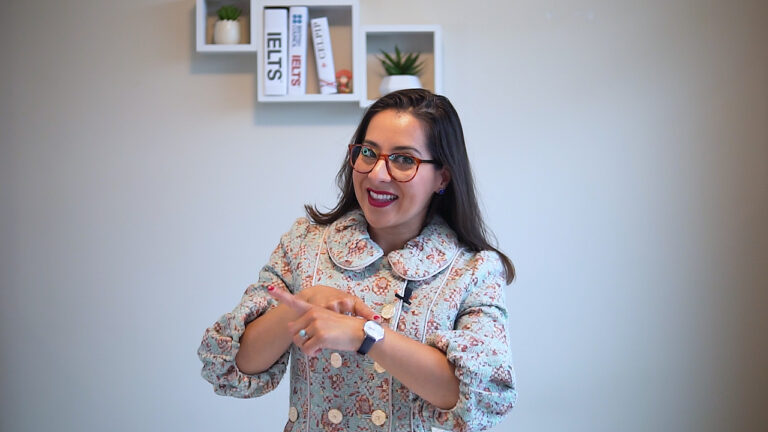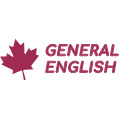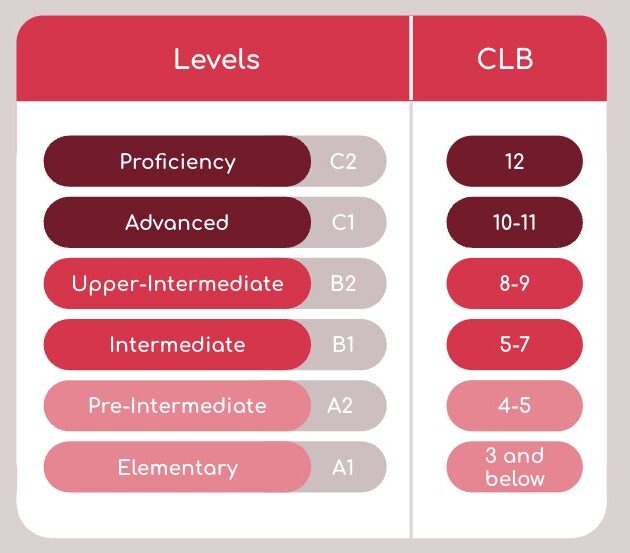What’s the difference between the IELTS and CELPIP?
Which test should I take? Which test is better, the IELTS or the CELPIP?
I’ve heard the CELPIP test is easier than the IELTS. Is that true?
I get these questions every. single. day. And while there is no one answer to them, I can definitely point you in the right direction!
You see, everyone is different, and you shouldn’t choose such an important test based on other people’s opinions. But don’t worry – I’m here to help! 🤓
Hi! I’m Maria and I’m a Level 3 certified Canadian CELPIP Expert and an IELTS examiner. I’m also the founder and CEO of English for Canada, an Official Member of the CELPIP Network.
That’s fancy language for: Paragon Testing (CELPIP Canada) has approved us as an official CELPIP exam preparation school and a trusted resource for those seeking to apply for Canadian Permanent Residency through the Comprehensive Ranking System (CRS). To prove your language skills, you must take a language test and enter your results into your Express Entry profile and that’s why I’m here to help.
Over the years, I’ve coached thousands of students from around the world on how to get the band scores they need on their IELTS or CELPIP tests with proven results.
What you’re about to read is my honest and detailed breakdown of both tests based on my years of teaching and testing experience.
I want you to choose the best test for you. I’m on your side, so let’s get started!
Now let’s be honest. The IELTS and CELPIP exams are challenging. But the good news is – getting the band scores of your dreams is not impossible.
You CAN immigrate to Canada. It is possible. Our students are proof!
But the reality is that both tests require study prep, dedication, mental stamina, and a realistic study plan according to your proficiency level and objective.
And before we get into the nitty gritty details of both tests, it’s important to realize that while there are definitely test strategies you can and must learn, you will still have to improve your overall English proficiency level to get the results you’re looking for.
There are simply no shortcuts when it comes to learning a language. Learning a new language takes time.
The Canadian Language Benchmark
If you need to take the IELTS General Training test or the CELPIP test, you need to achieve a specific CLB (Canadian Language Benchmark). In other words, you need to prove a specific English proficiency level for your immigration process.
The final result on your IELTS or CELPIP test will be converted into a CLB level based on what you scored on each exam section. The final CLB rating is different between the IELTS and the CELPIP test so find out exactly which band scores you need.
If you need a CLB 9, take note that the CELPIP test considers your lowest band score as your final CLB.
In theory, the CLB does not change from one test to another. That’s because the CLB levels are standardized and you are rated on a scale. In other words, the CLB 7, 8, or 9 are rated the same way on both tests.
That’s why saying one test is “easier” than the other isn’t really possible.
However, you might find one test format easier than the other, and this can make a big difference in your final results.
Now before paying around $300 for your next test, you should definitely consider these factors:
-
- Which CLB do you need?
-
- The band scores you need might impact your decision. If you need a CLB 7 or 8, both exams work just fine, but a CLB 9 is a really high band score (equivalent to C1 advanced proficiency level) and definitely requires a proper or longer exam prep.
-
- Which CLB do you need?
-
- What is your current proficiency level?
-
- The bigger the gap between your current proficiency level and your final objective, the longer you will take to prepare. Remember that improving your English can also take time.
-
- What is your current proficiency level?
-
- How much time do you realistically have to study?
-
- What’s your daily schedule like? Are you really ready to invest some time studying?
-
- How much time do you realistically have to study?
-
- How do you cope with test anxiety?
-
- Most candidates struggle with test anxiety at some point, so it’s important to come up with a game plan so that you take your test confidently.
-
- How do you cope with test anxiety?
So should you take the IELTS or the CELPIP?
Let’s break down both of these tests according to each exam section, shall we?
Is the CELPIP Listening Test really easier than the IELTS?
If you need a CLB 9 for your immigration profile, then you’ve realized how challenging the listening tests for the IELTS and the CELPIP can be.
Getting that pesky Band 8 on the IELTS listening test is definitely not easy! This is exactly why many candidates migrate over to the CELPIP.
Does it sound like I’m talking directly at you? 😉
In my experience, many students choose to take the CELPIP exam because they find the listening test a lot easier than on the IELTS.
I do find the CELPIP listening test easier, but it also comes with its set of challenges. Don’t assume you can just take it without studying.
Here are some helpful differences between the two listening tests so that you can decide which test is better for you:
Duration: The CELPIP listening test is longer (almost 1 hour) while the IELTS listening test is about 30 minutes. If you find it difficult to pay attention to an audio passage for a long period of time, this may be worth considering.
Format: The CELPIP has 6 sections and the IELTS has 4.
Style: Both can be done on the computer now, but the IELTS also has the paper-based version available. In general, most candidates prefer the computer-delivered IELTS and I encourage avoiding the paper-based IELTS listening test as not every IELTS exam centre offers headsets just yet (most do, at least in Canada).
Equipment: If you do choose the IELTS, make sure you choose an exam centre with a headset so that you can properly hear your test. The CELPIP test will always include a headset.
Approach: On the CELPIP, you only get to read the questions after you’ve listened to the audio passage. This means that note-taking is super important. On the IELTS, you have 1 minute to read and analyze your questions before you listen, and this helps you prepare yourself for what’s coming. Check out our tips on how to take notes on your CELPIP listening test.
Question Types: The CELPIP has 3 different question types while the IELTS has 6.
Multiple Choice: The CELPIP always includes a drop-down menu whereas the IELTS has fill-in-the-blank style answers. This means you can always guess your answers on the CELPIP – a huge plus!
Spelling: Since the CELPIP only has a drop-down menu with options, you won’t have to worry about spelling. On the other hand, the IELTS test takes spelling into consideration. This is a major reason why many candidates get answers wrong.
Accents: The CELPIP test only includes Canadian accents. The IELTS test includes speakers with a variety of accents (British, American, Australian). This is a big one!
Video: The CELPIP listening test even includes a video. The IELTS does not. Now sometimes the videos can be a challenge because you have to focus on what the speakers are wearing too, so pay attention.
So as you can see, we can’t just assume that one test is always easier for everybody. Some students end up choosing the IELTS listening test, and that’s okay too.
At the end of the day, I encourage trying some of the free sample tests available on the official CELPIP website or on an official IELTS website (definitely do not study off of Youtube or someone’s random website or channel, please).
Make sure you’re studying from authentic and qualified test preparation material that includes official paid practice tests like my Prometric-testing approved CLB 9 CELPIP self-study course.
That way you can get a feel for which exam format you prefer. Also, while we’re on the topic of listening, check out our other blog post on the pros and cons of the CELPIP listening test.
The IELTS Reading Test vs. The CELPIP Reading Test
Both reading tests are very similar in terms of difficulty. Remember, the English itself within the reading passages is the same on both tests.
You are being assessed on your comprehension, but as you probably already know, getting the band score you need on your reading test also means learning exam test strategies.
Here are some differences between the two reading exams:
Duration: Both tests last about 1-hour long, and they both get progressively more difficult. In other words, each reading section gets more challenging than the one before.
Format: The CELPIP has 4 sections and the IELTS has 3. Note that the CELPIP also includes 1-2 additional practice tasks for test development which can tire you out. In other words, instead of having 4 sections, your test might actually have 5-6. However, only 4 count towards your actual test.
Number of Questions: Both have about 40 questions.
Style: Both can be done on the computer, but the IELTS also has the paper-based version available. In general, most candidates prefer the computer-delivered IELTS over the paper based.
Approach: Both tests require specific exam strategies. Check out our personalized lessons for the IELTS or the CELPIP if you need help passing your test.
Question Types: The CELPIP has 3 different question types while the IELTS has over 10.
Multiple Choice: The CELPIP always includes a drop-down menu whereas the IELTS has fill-in-the-blank style answers. This means you can always guess the answer on the CELPIP.
Spelling: Since the CELPIP only has a drop-down menu with options to fill in the sentences, you won’t have to worry about spelling. 😀 On the other hand, the IELTS test takes spelling into consideration.
Instructions: Sometimes the instructions on the IELTS can be tricky like “no more than one word”, and students can easily get questions wrong simply because they didn’t follow the instructions. In general, this doesn’t happen on the CELPIP.
Topics: The CELPIP test only includes Canadian topics about everyday life whereas the IELTS may include more international topics. Arguably, the CELPIP test includes more functional, everyday language; however, don’t be fooled! Task 4 of the CELPIP reading test isn’t easy as it includes lots of challenging vocabulary.
Vocabulary: Since the CELPIP test is Canadian, you’ll only see Canadian vocabulary on the reading test. This is very helpful for test takers who live in Canada and are used to hearing and reading Canadian vocabulary.
Which Writing Test is Easier? The IELTS or the CELPIP?
The Writing test is arguably one of the two most challenging sections of the exam.
Why?
Because your final band score is determined by an IELTS or CELPIP examiner. And yes, examiners are human! Even though the test is standardized, your band score is not determined by a computer.
Both IELTS and CELPIP examiners are highly trained and experienced English teachers, and they will determine your band score based on a set of very specific assessment criteria.
The performance standards for both tests are very similar.
However, there are major differences between the format of these two tests.
Either way, if you don’t prepare for your exam according to their assessment criteria, you just won’t get the band scores you need. Even a native speaker would need to prepare for their test! Find out why most students don’t pass their test.
Differences in format between the IELTS Writing Test and the CELPIP Writing test
Now in terms of the exam formats, Writing Task 1 is the same on both the IELTS and the CELPIP test.
You’ll have to write a 150-word email/letter with the same instructions and expectations, but in terms of time management, on the CELPIP you’ll have about 5 more minutes to complete the task.
On the CELPIP test, you’ll have about 25 minutes to write your letter, and on the IELTS, you should plan/aim to complete it within 20 minutes.
As for Writing Task 2, the IELTS requires you to write a complete academic-style essay, and the CELPIP asks you to complete a survey response.
The CELPIP survey response does not need to follow an academic-style format; however, formatting your writing is still a must. To learn how in 5 easy steps, get in touch with our team or check out our CLB 9 CELPIP self-study course for sample responses.
How are the IELTS writing test and the CELPIP writing tests different?
Word count: The IELTS has a minimum word count of 250 words for Task 2 and 150 for Task 1, however, don’t worry about counting your words. You’ll only stress yourself out and the examiners don’t have time to count your words either. They are focused on assessing your English. Not counting your words. The CELPIP test has a minimum word count of 150-200 for both tasks. Keep in mind that even though the CELPIP requires less words, you have less time to write your response. Also, I find that having less words to play with actually makes it harder to fully develop your ideas.
Question Types: For Writing Task 2, the IELTS test has several different question types that you must be prepared for. We teach the differences between them in class in our one-on-one tutoring sessions. The CELPIP, on the other hand, only has one Task 2 question type. You’re expected to pick a survey option and explain why you’ve chosen it. To learn more about Task 2 on the CELPIP test, check out our CLB 9 self-study course.
Format: IELTS responses are expected to be more structured/academic whereas the CELPIP is a bit more flexible. However, in both cases, you must meet all of the assessment criteria. You can count on our team to teach you how to write a CLB 9+ response in our private coaching sessions!
Topics: Since the CELPIP test is a Canadian-based test, the topics and themes on the Writing test are based on daily life in Canada. The IELTS is an international English exam, so the topics on the exam are international. Either way, you’ll be able to think of ideas for both tests as they are about real-life issues.
Time Management: The CELPIP exam gives you approximately 25 minutes to complete each writing task. On the IELTS, you will be given 60 minutes and you have to manage your time.
Computerized: The CELPIP test is always done on the computer, and the IELTS has both the computer-delivered and paper-based version of the test.
Spellcheck: This a huge one! The CELPIP test has spellcheck, but the IELTS doesn’t. Keep in mind that similarly-spelled words like “quit” and quiet” will not be recognized by spellcheck, so meaning and accuracy are still important.
Since I know you want my opinion, I’ll say that my opinion has changed over the years.
I used to choose the IELTS writing test since the exam is highly standardized and it’s an older test, but after observing my students and working with both tests for many years now, I now prefer the CELPIP writing test.
Here are my reasons why:
The IELTS test requires more preparation time since you’ll need to learn how to write a solid academic-style essay. You’ll also need to fully learn the differences between the different IELTS question types.
However, after years of teaching examining experience, we can teach you this like a formula so if you know you want to take the IELTS, perhaps because you’ve already taken the Academic version in the past, do not worry! Check out our private IELTS tutoring sessions.
The CELPIP test raters have very similar assessment criteria; however, they don’t require an academic-style format to the survey response. There is only 1 question type to learn as well. As a result, I find my students can prepare in a shorter period of time.
I still encourage you to try out some free sample tests on the official IELTS and CELPIP websites and see which test you prefer.
The IELTS Speaking Test vs. The CELPIP Speaking Test
There is one MAJOR difference between the IELTS and CELPIP exam, and that is…THE SPEAKING TEST!
This exam section alone could be your deciding factor as to which exam you choose to take.
So let’s get into the differences.
Format: The CELPIP exam is held on a computer with 8 timed tasks. The IELTS exam is held in person with an IELTS Speaking examiner.
Privacy & Exam Environment: The CELPIP exam is held in a room with several other candidates typing or speaking at the same time, which can be distracting. The IELTS exam is in a quiet and private room between you and your speaking examiner.
Timer: You don’t need to worry about the timer on the IELTS exam as your examiner will monitor the time for you. However, on the CELPIP, you’ll need to study with a timer since you’ll be strictly timed throughout your entire speaking test. Learn how to beat the timer.
Topics: The IELTS topics are about everyday life and about you. The 8 questions on the CELPIP test vary from describing pictures to putting yourself in situations. If you need help preparing for your test, check out our CELPIP prep courses.
Duration: The IELTS Speaking test ranges from 11-14 minutes. The CELPIP speaking test is about 15-20 minutes long. The IELTS Speaking test happens either before or after the other 3 sections of your exam (there’s a break between these exam sections). One of the benefits of the CELPIP test here is that you don’t have to wait around for your speaking test or even schedule it for another day.
Overall, most of our students would agree that the IELTS speaking test is a much more comfortable test to take than the CELPIP speaking test, and as a result, they do better on their test.
At the end of the day, I personally find the IELTS Speaking test to be much more natural.
Why? You speak with a human. You get to have a natural conversation about you, your life and your opinions. You don’t have to be as creative and think of ideas on the spot.
It’s not very comfortable to speak with a computer and with a timer ticking in front of you. In fact, many students of mine have expressed that the CELPIP test environment has caused test anxiety, but being prepared and aware of the test environment beforehand definitely helps.
If you’re like the thousands of students who’ve got test anxiety, know that you’re not alone! You can overcome your test anxiety.
And if you feel nervous about speaking with an IELTS examiner, keep in mind that they aren’t scary. They want you to succeed, and they’ll always ask you questions so that you keep speaking.
While speaking with an examiner might seem scary at first, since they’re there to help guide your conversation, you’ll see just how much more comfortable you feel on your test day.
If you still prefer the CELPIP speaking test, that’s great too! Lots of our students have achieved their goals on the CELPIP test too. Just make sure you practice with a timer for all 8 speaking tasks. 👍
Just like anything, the more you practice, the more confident you’ll feel. Check out our CLB 9 CELPIP Prep course to hear over 54 sample responses and to gain access to our Speaking Test Toolkits.
One last question to help you pick your test
I know that was a lot of information, but if you’re about to invest in an important (and expensive) test that’s going to decide your future, I hope you’ve taken the time to consider these differences.
And if you’re still unsure and you really want my opinion…after years of working with both tests and supporting my students, I now prefer the CELPIP test over the IELTS test.
Keep in mind that this is a personal preference and I don’t always recommend it for everyone. Like I’ve said, each student is different and at the end of the day, you have to decide which test you prefer based on your needs.
For example, of you’ve already taken the Academic training IELTS in the past, then it wouldn’t make sense to switch to the CELPIP test.
Still unsure? Then consider the CLB you need.
If you need a CLB 4, 5, 6, 7, or 8, I think that both exams are great options!
But if you need that CLB 9, it’s worth it to make an educated decision by taking tons of practice tests before booking your next test. Getting a CLB 9 isn’t easy, and you want to make sure you pick the right test for you.
I strongly encourage that you try out some free sample tests from official sources like the official CELPIP website and the British Council for the IELTS.
Need help preparing for your test? You can count on our team of certified Canadian English teachers!
English for Canada as an official CELPIP preparation school.
We’re here to support you until you achieve your goals! So please check out our CLB 9 CELPIP Self-Study course, our CELPIP tutoring sessions, and our IELTS tutoring sessions so that you, too, can become one of our success stories.
You’ve got this!

















